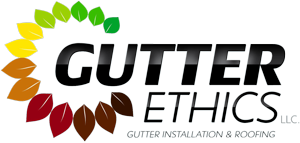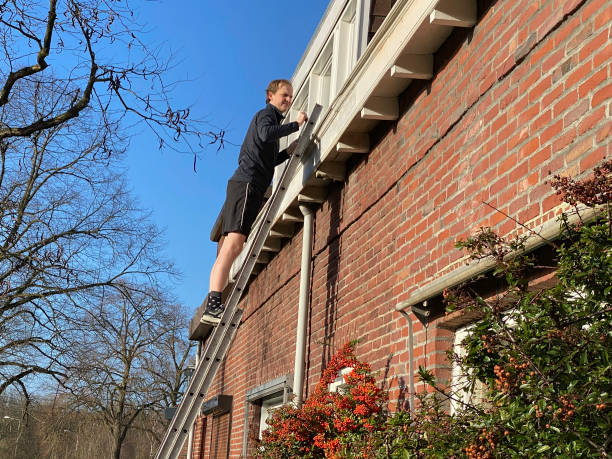How Heavy Rain Impacts Roof and Gutter Systems in Burke, VA
Burke, VA is known for its unpredictable weather, and heavy rain can be particularly damaging to your roof and gutter systems. While these systems are designed to protect your home from the elements, persistent or intense rainfall can put them to the test. Understanding how heavy rain impacts your roof and gutters is essential for maintaining the health of your home and preventing costly repairs.
Here’s a breakdown of how heavy rain affects your roof and gutters and what you can do to protect your home.
1. Increased Risk of Roof Leaks
One of the most common issues caused by heavy rain is water infiltration through your roof. Even minor roofing issues can escalate when there’s a downpour. Here’s how it happens:
- Damaged Shingles: Heavy rain, especially when combined with wind, can cause shingles to lift or crack. If water gets underneath damaged or missing shingles, it can lead to leaks in your home, resulting in water stains on your ceilings, walls, or attic.
- Clogged Roof Valleys: Roof valleys (the areas where two slopes meet) are particularly vulnerable during heavy rain. If debris accumulates in the valleys or the flashing is damaged, water can pool and leak into your home.
- Flashing Issues: Flashing around chimneys, skylights, and other roof penetrations is crucial for keeping water out. However, heavy rain can exploit any weaknesses in this flashing, causing leaks around vulnerable areas.
2. Gutter Overflow and Blockages
Gutters are essential for directing rainwater away from your roof and foundation. However, heavy rain can overwhelm your gutter system, especially if it’s not properly maintained.
- Clogged Gutters: When gutters are clogged with leaves, debris, or dirt, they can’t function properly during heavy rainfall. The water may overflow over the sides of the gutters, causing it to pool around your roof, walls, and foundation. This can lead to significant water damage over time.
- Gutter Sagging and Damage: If your gutters are already compromised or clogged, heavy rain can put additional stress on them, causing them to sag or pull away from the house. This can result in costly repairs or even gutter replacement if not addressed quickly.
- Overflow and Foundation Damage: When gutters overflow, water can flow toward the foundation of your home. Over time, this can cause cracks in the foundation, leading to moisture intrusion and possible mold growth in your basement.
3. Roof Drainage Problems
If your roof is not properly designed to handle heavy rainfall, water can accumulate in areas that aren’t designed to handle excess moisture. This can cause a variety of issues:
- Pooling Water: Low spots or inadequate drainage can cause water to pool on your roof during heavy rain. Standing water can cause long-term damage to your roofing material and eventually lead to leaks or structural issues.
- Poorly Maintained Roof Pitch: The pitch (slope) of your roof is designed to guide rainwater toward the gutters. If your roof has an inadequate pitch or if the slope is compromised, water can accumulate on the roof instead of being directed away.
4. Roof and Gutter Damage from Wind and Rain
Heavy rain is often accompanied by strong winds. The combination of wind and rain can cause significant roof and gutter damage:
- Wind-Lifted Shingles: When strong winds combine with heavy rain, they can lift shingles or even blow them off the roof entirely. This can leave your roof vulnerable to leaks and water damage.
- Debris Damage: Wind can also blow branches, leaves, and other debris into your gutters and onto your roof. This debris can clog the gutters, creating blockages that prevent the proper flow of water.
5. Increased Risk of Mold and Mildew Growth
When rainwater infiltrates your roof or gutters, it can create an environment conducive to mold and mildew growth. Mold thrives in wet, humid environments, so any water that is allowed to sit or seep into your attic, walls, or foundation can lead to mold issues. This can result in health concerns and costly mold remediation.
- Roof Leaks and Mold: Roof leaks caused by heavy rain can lead to moisture buildup in your attic, promoting mold growth in the insulation or wooden beams. This can be expensive to fix and poses health risks to your household.
- Gutter Overflow and Mildew: Overflowing gutters that direct water to your foundation can lead to moisture buildup around the base of your home. This can create an ideal environment for mold and mildew to grow, especially in basements and crawl spaces.
6. Water Damage to Landscaping
Though not a direct impact on the structure of your home, heavy rain can also affect the landscaping around your home, especially if your gutters are not functioning properly.
- Soil Erosion: Overflowing gutters can cause water to spill onto your lawn and landscaping, eroding the soil and damaging plants and shrubs. Over time, this can lead to uneven ground and damage to your garden.
- Foundation Issues: Improperly directed rainwater can pool around the foundation of your home, potentially seeping into the basement or crawl space, causing water damage and possible foundation settlement.
How to Protect Your Roof and Gutter System
Given the potential risks heavy rain poses to your roof and gutters, it’s crucial to take steps to protect your home:
- Regular Roof Inspections: Have a professional inspect your roof at least once a year, and after any significant storm, to identify any damage that could worsen during heavy rain. Look for missing or cracked shingles, damaged flashing, and any areas that may need repair.
- Clean and Maintain Gutters: Regularly clean your gutters to remove debris and ensure that water flows freely. If necessary, install gutter guards to reduce the accumulation of leaves and debris. Ensure your downspouts are clear of blockages and direct water at least 3-4 feet away from the foundation.
- Consider Gutter Repair or Replacement: If your gutters are sagging, leaking, or otherwise damaged, it’s worth repairing or replacing them before the next heavy rain. Properly functioning gutters are essential for protecting your home from water damage.
- Fix Drainage Issues: Ensure that your roof is properly pitched and drains water effectively. If your roof has pooling areas, consult with a roofing professional to improve its drainage system.
Trusted Roofing and Gutter Company Serving Burke, VA and Surrounding Areas
Heavy rain can be a significant challenge, as it can lead to roof leaks, gutter blockages, and water damage around the foundation of your home. By regularly maintaining your roof and gutters and addressing any damage promptly, you can protect your home from the long-term effects of heavy rain. If you need assistance with roofing or gutter maintenance, don’t hesitate to reach out to Gutter Ethics LLC. We are here to help you keep your roof and gutters in top condition, so you can rest easy during any storm.
If you’re ready to take the stress out of gutter maintenance, contact us today. Let us show you why we’re the best in the business!

